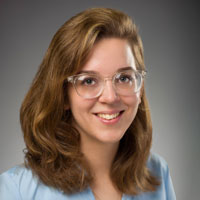Woehlke awarded NIH F31 Grant for intra-ocular imaging research
August 15, 2024
 Ruth Woehlke, graduate student in the Marquette-MCW Joint Department of Biomedical Engineering and member of the Ocular & Computer Vision Laboratory (OCVL), has received an F31 grant from the National Institutes of Health for a project that seeks to bridge a fundamental gap in AO and ophthalmological imaging while providing comprehensive training in retinal imaging, optical and mathematical design, software development, engineering fundamentals, and system integration.
Ruth Woehlke, graduate student in the Marquette-MCW Joint Department of Biomedical Engineering and member of the Ocular & Computer Vision Laboratory (OCVL), has received an F31 grant from the National Institutes of Health for a project that seeks to bridge a fundamental gap in AO and ophthalmological imaging while providing comprehensive training in retinal imaging, optical and mathematical design, software development, engineering fundamentals, and system integration.
Ophthalmoscopy is a medical exam allowing scientists and physicians visual access to the inside of the eye. With a focus on the retina, ophthalmoscopy is used to help diagnose retinal and systemic diseases of the eye. However, conventional ophthalmic devices often struggle to visualize smaller features due to optical aberrations, or minor abnormalities of the eye that prevent light from focusing evenly. Adaptive optics (AO) can help improve these images but comes with its own limitations. Current AOSLO (AO scanning light ophthalmoscope) split-detection techniques cannot adequately visualize differently angled inter-ocular features or resolve very small features. Most existing AOSLO systems require extensive mechanical modifications for upgrades, limiting widespread AO imaging accessibility.
Titled, “Expanding the Accessibility and Quality of Ophthalmic Imaging through Optical Elements and Modeling,” Woehlke’s project aims to develop optical elements and models to enhance AOSLO imaging for broader populations and with higher resolution. To accomplish this, Woehlke will first implement a Dove prism for arbitrary-angle split detection imaging, improving visualization of various retinal structures like blood vessels. This new prism will make upgrading existing systems easier. Second, Woehlke looks to explore and integrate variable in vivo illumination profiles—such as Fresnel Zone Plates, light axicons, and annular masks—in attempts to produce clearer images. This would enable superior imaging across diverse subject groups.
VIEW MORE BME GRADUATE STUDENT RESEARCH
LEARN MORE ABOUT OCVL

 Ruth Woehlke, graduate student in the Marquette-MCW Joint Department of Biomedical Engineering and member of the Ocular & Computer Vision Laboratory (OCVL), has received an F31 grant from the National Institutes of Health for a project that seeks to bridge a fundamental gap in AO and ophthalmological imaging while providing comprehensive training in retinal imaging, optical and mathematical design, software development, engineering fundamentals, and system integration.
Ruth Woehlke, graduate student in the Marquette-MCW Joint Department of Biomedical Engineering and member of the Ocular & Computer Vision Laboratory (OCVL), has received an F31 grant from the National Institutes of Health for a project that seeks to bridge a fundamental gap in AO and ophthalmological imaging while providing comprehensive training in retinal imaging, optical and mathematical design, software development, engineering fundamentals, and system integration.